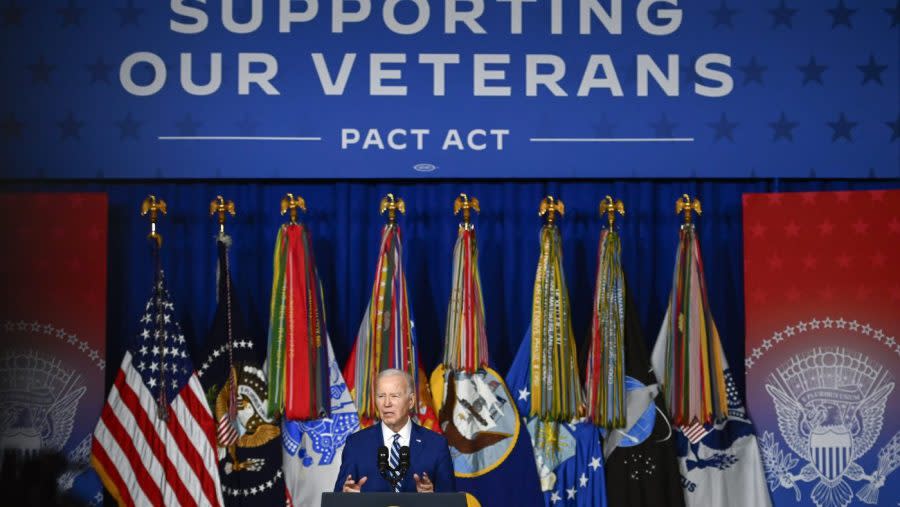White House lauds PACT Act as it hits 1 million toxin claims granted to vets

- Oops!Something went wrong.Please try again later.
The White House announced Tuesday that more than 1 million claims have been granted through the PACT Act, a landmark law passed in 2022 that gave veterans expanded access to apply for compensation and relief related to toxic exposures during service.
More than 880,000 veterans are receiving disability benefits through the PACT Act across the entire country and its territories, according to the White House.
President Biden is expected to formally deliver the news later Tuesday during an event with veterans and their families while in New Hampshire.
Secretary of Veterans Affairs (VA) Denis McDonough said the PACT Act has “helped us bring VA to vets, rather than making them change their lives to come to us.”
“Now, the president’s been quite clear that we at the VA have more work to do and nothing will stop us from fulfilling our sacred obligation … to serve America’s vets every bit as well as they have served us,” he said in a press call. “We won’t rest until every veteran and every survivor gets the VA health care and benefits they deserve.”
The VA still has many more claims to work through. Last year, veterans submitted more than 2.4 million claims, a 39 percent increase from 2022, for a total of 4.17 million claims since the PACT act became law.
“We’re processing those claims at the fastest rate in history,” said McDonough.
The PACT Act has also created $5.7 billion in earned benefits for veterans, and more than 5 million veterans have received free screenings for toxic exposures through the law.
The White House also released a specific breakdown Tuesday of how many claims have been granted through the PACT Act in each state. Texas has the highest number granted at 110,629, followed closely by Florida at 87,792 and California with 74,363.
Neera Tanden, White House domestic policy adviser, said Biden has been proud of the VA’s “fast actions and diligent implementation” of the claims.
“The PACT Act is changing the way we serve toxic exposed veterans,” she said in a press call. “This is truly personal for the president, given his experiences as a military parent.”
Military service can increase the health risks, as service members can come into contact with toxins from burn pits and other toxic exposures while on duty or in training. But because major diseases such as cancer can take years to develop, it can be hard for a veteran to link service to the disease.
The PACT Act, however, made it easier to file claims by presuming that a veteran came into contact with toxins during service and easing the burden of proof for those seeking medical help.
It also extended these services for the first time to the Vietnam War, the Gulf War and the post-9/11 wars in Afghanistan and Iraq.
In March, the VA announced that millions more veterans would be eligible to enroll directly into VA health care for toxic exposure without the need to first apply for VA benefits, reducing the time to wait for claim relief by up to eight years.
A senior administration official said the conditions and diseases addressed by the PACT Act so far include bronchial asthma, hypertension and sinusitis. The White House also said in a fact sheet it is prioritizing cancer with the PACT Act.
The PACT Act is having a big effect across the VA. More than 440,000 veterans enrolled into VA health care last year, a 30 percent increase year-over-year. The VA has expanded its staff to meet the demand.
“The bottom line here is we are bringing more veterans in,” the official said. “We are getting them the care that they deserve. And they’re currently reporting trust levels in the outpatient arena — nearly 92 percent, which is the highest ever.”
For the latest news, weather, sports, and streaming video, head to The Hill.

